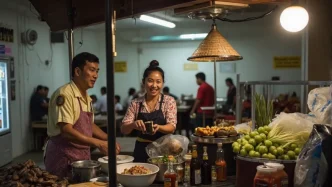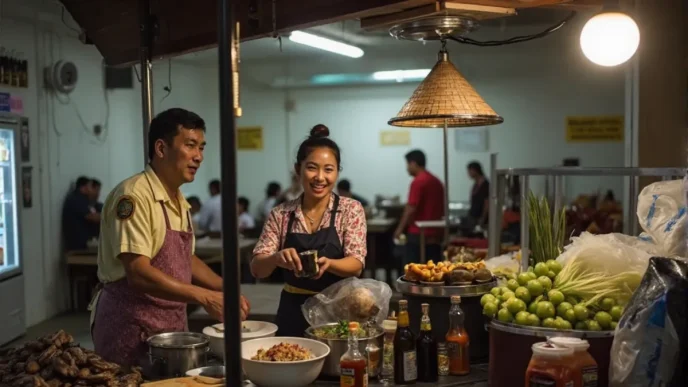In a deeply emotional moment, Thai Prime Minister Paetongtarn Shinawatra held a video call with five Thai nationals recently released from captivity by Hamas, now safe in Tel Aviv, Israel. The release marks a significant breakthrough for the Thai government, which has been tirelessly advocating for its citizens caught in the crossfire of the ongoing conflict in the region. Paetongtarn expressed profound relief at seeing the group safe, praising the collaborative efforts of all parties involved in securing their freedom.
The five Thai nationals, whose identities remain undisclosed for privacy reasons, were reported to be in good spirits during the conversation. Foreign Minister Maris Sangiamphongsa, currently in Israel to oversee the situation, noted their gratitude for the rescue operation. One representative of the group spoke on behalf of the others, expressing heartfelt thanks for the support that they said had given them “a new life.”
This development comes as a rare piece of positive news amidst the broader turmoil in the Middle East, where Thai workers, often employed in agriculture or construction, have found themselves vulnerable to escalating violence. The Thai government’s response, led by Paetongtarn, has underscored a commitment to the safety and welfare of its citizens abroad, even as challenges remain with one Thai national still in captivity and the bodies of two deceased workers yet to be repatriated.
A Personal Commitment from the Prime Minister
During the video call, Paetongtarn conveyed her personal concern for the hostages, stating that she had been closely monitoring their situation since the crisis began. “I am relieved to see you safe,” she told them, acknowledging the immense efforts by Thai and Israeli authorities, as well as other stakeholders, in facilitating their release. Her words carried a tone of genuine empathy, reflecting the gravity of the situation for the families and communities back home in Thailand who have been anxiously awaiting news.
Following the call, the Prime Minister took to social media platform X (@ingshin) to share her relief with the public. “I am immensely relieved that all the hostages have been released and are safe,” she wrote, detailing the government’s persistent coordination with Israeli authorities at every level to secure their freedom. She also reiterated her administration’s dedication to the remaining Thai hostage and the repatriation of the deceased workers, urging swift action on both fronts.
Paetongtarn’s proactive stance has been a hallmark of her leadership since assuming office, with a particular focus on protecting Thai nationals abroad. Her government’s response to this crisis has drawn attention to the broader challenges faced by migrant workers, who form a significant portion of Thailand’s overseas workforce, often in high-risk areas.
Ensuring Welfare and Compensation
Beyond the emotional reunion, Paetongtarn has directed the Ministry of Foreign Affairs to ensure the physical and mental well-being of the released individuals. The Thai embassy in Israel has been tasked with following up on financial entitlements and benefits owed to the former hostages, both from Israeli and Thai sources. These include compensation from Israel’s National Insurance Institute, which offers monthly payments of 1,000 shekels (approximately 10,000 baht) until the age of 67, annual payments of 12,000 shekels (approximately 120,000 baht) between ages 67 and 80, and 15,000 shekels (approximately 150,000 baht) annually from age 80 onwards.
Additionally, the former hostages are entitled to unpaid wages from their Israeli employers, war-related repatriation aid of 15,000 baht from Thailand’s Overseas Employment Assistance Fund, and retirement benefits from the country’s social security system. These measures aim to provide a safety net for the individuals as they rebuild their lives after the traumatic experience of captivity.
The Prime Minister’s emphasis on post-release support highlights a broader policy focus on the welfare of Thai migrant workers, many of whom face significant risks abroad with limited resources to fall back on. This incident may prompt further discussions on how to better protect such workers, including through enhanced diplomatic channels and international cooperation.
The Broader Context: Thai Workers in Conflict Zones
The plight of the Thai hostages is a stark reminder of the vulnerabilities faced by migrant workers in conflict zones. Thailand has long been a source of labour for countries in the Middle East, with tens of thousands of its citizens employed in sectors like agriculture and construction in Israel alone. While these jobs offer economic opportunities often unavailable at home, they come with significant risks, particularly in areas prone to violence or political instability.
The current conflict in Israel and Gaza has placed these workers in an especially precarious position. Since hostilities escalated, the Thai government has faced mounting pressure to ensure the safety of its nationals, many of whom lack the means to return home independently during crises. The successful release of the five hostages is a testament to the government’s diplomatic efforts, but the remaining challenges—securing the freedom of the last hostage and repatriating the bodies of the deceased—underscore the complexity of the situation.
Analysts suggest that this incident could serve as a catalyst for Thailand to reevaluate its policies on labour migration to high-risk areas. While the economic benefits of such work are undeniable, the human cost has become increasingly apparent. If confirmed, potential reforms to labour export policies may include stricter vetting of destination countries, mandatory safety training for workers, or the establishment of emergency evacuation funds. However, no official proposals have been announced, and any changes would likely require extensive coordination with both domestic stakeholders and international partners.
A Government Under Scrutiny
Paetongtarn’s handling of the hostage crisis has not gone unnoticed, both at home and abroad. Domestically, her visible involvement has bolstered her image as a leader attuned to the needs of ordinary Thais, particularly those from rural and working-class backgrounds who form the bulk of the country’s migrant workforce. Public sentiment, as reflected in social media posts and local news coverage, has largely been positive, with many praising the government’s persistence in securing the hostages’ release.
However, the government also faces criticism over the broader issue of migrant worker safety. Opposition voices have questioned why more preventive measures were not in place to protect Thai nationals in conflict zones, pointing to past incidents where workers have been caught in similar situations. The debate over whether the government should restrict labour migration to volatile regions is likely to intensify in the coming months, especially if further incidents occur.
Internationally, Thailand’s diplomatic efforts have been acknowledged by partners in Israel and beyond. The coordination with Israeli authorities, as highlighted by Paetongtarn, demonstrates the importance of bilateral relations in addressing such crises. Yet, the situation also raises questions about the role of international organisations in protecting migrant workers, particularly those from less affluent nations who may lack the leverage to negotiate on equal terms.
Looking Ahead: Unresolved Challenges
While the release of the five Thai nationals is a cause for celebration, the government’s work is far from over. The Prime Minister has made it clear that her administration remains “fully committed” to securing the release of the remaining Thai hostage and ensuring the swift return of the bodies of the two workers who tragically lost their lives. These unresolved issues serve as a sombre reminder of the ongoing risks faced by Thai citizens in conflict zones.
The government’s response in the coming weeks will likely shape public perception of its broader foreign policy and labour protection strategies. If successful in resolving the remaining cases, Paetongtarn’s administration could strengthen its credibility on both domestic and international fronts. Conversely, any delays or setbacks may fuel criticism over the perceived lack of preparedness for such crises.
For the released hostages, the road to recovery will be a long one. Beyond the immediate financial support, their physical and psychological well-being will require sustained attention. The Thai government’s commitment to their care, as articulated by Paetongtarn, will be crucial in helping them reintegrate into their communities and reclaim a sense of normalcy after their ordeal.
A Moment of Relief Amidst Uncertainty
The release of the five Thai hostages offers a moment of relief in an otherwise fraught geopolitical landscape. For the individuals and their families, it marks the end of a harrowing chapter and the beginning of a new one, filled with hope but also uncertainty. For the Thai government, it represents a hard-won victory in a crisis that has tested its diplomatic and logistical capabilities.
As the situation continues to evolve, the focus will remain on the remaining hostage and the repatriation of the deceased. Paetongtarn’s leadership during this period will be closely watched, not only as a measure of her administration’s effectiveness but also as a reflection of Thailand’s broader commitment to its citizens, no matter where they are in the world. In the meantime, the resilience of the freed hostages and the tireless efforts of those who worked for their release stand as a powerful testament to the strength of human solidarity in the face of adversity.














